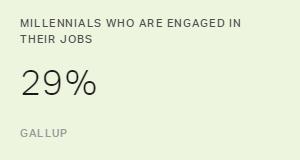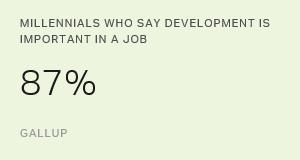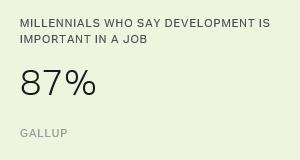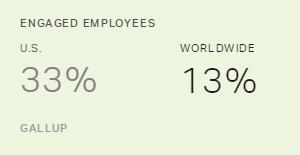Story Highlights
- Millennials differ in significant ways from other generations
- Yet they share basic employee needs with older workers
- Understanding millennials is the first step toward engaging them
Much of what matters to organizations -- from performance to customer service to stock prices -- hinges on a deep understanding of how their millennial employees live and work.
That's because millennials -- the youngest of whom are college-aged -- will grow to dominate the workplace. Millennial workers currently make up 38% of the U.S. workforce. Some estimate that they will make up as much as 75% of it by 2025.
Gallup recently released what is believed to be the most robust and comprehensive study of the millennial generation to date. This research combined more than 30 separate studies and included more than 1 million respondents.
The report, How Millennials Want to Work and Live, revealed that only 29% of millennials are engaged at work, with the remaining 71% either not engaged or actively disengaged. What's more, six in 10 millennials say they're open to different job opportunities, and only 50% plan to be with their company one year from now.
This low engagement is troubling, as Gallup's latest meta-analysis shows that business units in the top quartile of employee engagement are 17% more productive, suffer 70% fewer safety incidents, experience 41% less absenteeism, have 10% better customer ratings and are 21% more profitable compared with business units in the bottom quartile.
Job Clarity and Work Priorities
The first step toward engaging millennials is understanding the differences in how they live and work compared with other generations. Many leaders are on the right track, having acknowledged that millennial employees differ from other workers in their needs and desires.
But Gallup has also uncovered many characteristics that millennial employees have in common with other generations.
Regardless of generation, for example, employees need to know what's expected of them in the workplace. It's extremely stressful for any worker to lack an understanding or awareness of job responsibilities. In fact, Gallup finds that 72% of millennials who strongly agree that their manager helps them set performance goals are engaged.
Setting performance goals is one major necessity; of similar importance is knowing how to prioritize work responsibilities. Employees require job clarity so they have an understanding of what to do. They also require direction in establishing priorities -- knowing the order in which tasks should get done.
Prioritizing is a distinct need for millennial employees: Just 54% of millennials strongly agree that they know how to prioritize responsibilities at work, compared with 71% of those from older generations.
Organizations need great management to overcome this obstacle. When managers get involved and help with prioritization, it greatly improves employee engagement. Nearly seven in 10 millennials who strongly agree that their manager helps them establish priorities are engaged, compared with 27% of millennials who do not strongly agree.
Accountability
A common misconception is that millennials feel entitled -- that they expect advancement on Day One in the workplace, even in the absence of performance.
This isn't necessarily true. In reality, millennials want to be held accountable for their performance. In fact, nearly six in 10 millennials (56%) who report that their manager holds them accountable are engaged in their work.
To put this in context, if only 29% of millennials are engaged at work, then these findings suggest that managers can double the likelihood of engaging millennial employees by doing something many would consider simple and intuitive: holding them accountable. Millennials, like all employees, seek and desire accountability. When leaders and managers consistently hold employees accountable, they get the most out of employees' performance and make them happier and more likely to stay.
When developing strategies for covering the fundamentals, it's critical to employ best practices for the most effective people management. Focusing on the basics -- such as role clarity and accountability -- positions organizations to drastically improve every worker's engagement.



